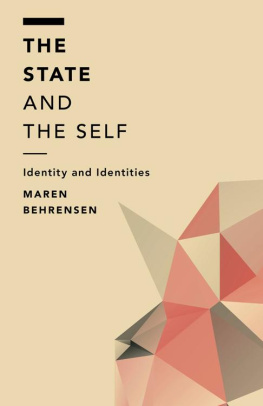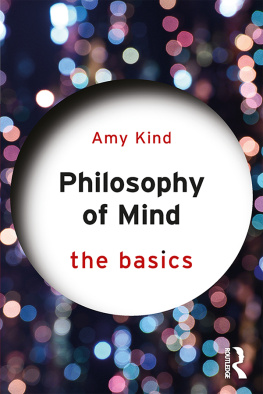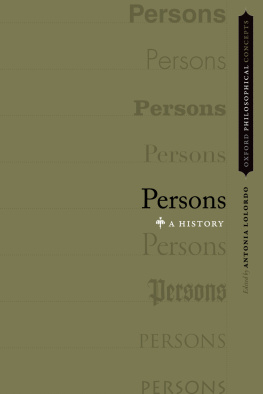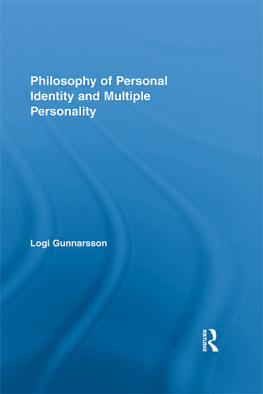
Series page
Key Concepts in Philosophy
- Guy Axtell, Objectivity
- Heather Battaly, Virtue
- Lisa Bortolotti, Irrationality
- Joseph Keim Campbell, Free Will
- Roy T. Cook, Paradoxes
- Douglas Edwards, Properties
- Ian Evans and Nicholas D. Smith, Knowledge
- Bryan Frances, Disagreement
- Douglas Kutach, Causation
- Carolyn Price, Emotion
- Darrell P. Rowbottom, Probability
- Daniel Speak, The Problem of Evil
- Matthew Talbert, Moral Responsibility
- Deborah Perron Tollefsen, Groups as Agents
- Joshua Weisberg, Consciousness
- Chase Wrenn, Truth
Copyright page
Copyright Amy Kind 2015
The right of Amy Kind to be identified as Author of this Work has been asserted in accordance with the UK Copyright, Designs and Patents Act 1988.
First published in 2015 by Polity Press
Polity Press
65 Bridge Street
Cambridge CB2 1UR, UK
Polity Press
350 Main Street
Malden, MA 02148, USA
All rights reserved. Except for the quotation of short passages for the purpose of criticism and review, no part of this publication may be reproduced, stored in a retrieval system, or transmitted, in any form or by any means, electronic, mechanical, photocopying, recording or otherwise, without the prior permission of the publisher.
ISBN-13: 978-0-7456-5431-7
ISBN-13: 978-0-7456-5432-4 (pb)
A catalog record for this book is available from the British Library.
Library of Congress Cataloging-in-Publication Data
Kind, Amy.
Persons and personal identity / Amy Kind.
pages cm
Includes bibliographical references and index.
ISBN 978-0-7456-5431-7 (hardback : alk. paper) ISBN 978-0-7456-5432-4 (pbk. : alk. paper) 1. Individualism. 2. Persons. 3. Identity (Psychology) I. Title.
B824.K56 2015
126dc23
2014046428
Typeset in 10.5 on 12 pt Sabon
by Toppan Best-set Premedia Limited
Printed and bound in the UK by CPI Group (UK) Ltd, Croydon
The publisher has used its best endeavors to ensure that the URLs for external websites referred to in this book are correct and active at the time of going to press. However, the publisher has no responsibility for the websites and can make no guarantee that a site will remain live or that the content is or will remain appropriate.
Every effort has been made to trace all copyright holders, but if any have been inadvertently overlooked the publisher will be pleased to include any necessary credits in any subsequent reprint or edition.
For further information on Polity, visit our website:
politybooks.com
Acknowledgements
I was first seriously introduced to issues about personal identity as an undergraduate in a class taught by Jyl Gentzler. As a graduate student, my thinking about persons and personal identity was further shaped by various classes and helpful conversations with professors such as Robert Adams, Joseph Almog, Keith Donnellan, Kit Fine, and Seana Shiffrin. I am grateful to all of them.
The Berger Institute at Claremont McKenna College (CMC) provided me with a summer research grant that facilitated some of my early work on this project. I greatly appreciate their support.
One of the joys of teaching at CMC has been to get to work closely with our excellent students. My thinking about persons and personal identity has been shaped over the years by students in various classes, perhaps most notably in the sections that I've taught of Metaphysics, Metaphysics of Persons, and Philosophy through Science Fiction. I am especially indebted to two CMC students in particular. First, this book would not have been possible without the help of my undergraduate research assistant Sara Stern. Not only did she conduct an extensive literature search for me at an early stage of this project, but she also synthesized her results in several insightful and beautifully compiled reports. in particular was greatly influenced by her work. More recently, this book has benefitted from the careful comments and bibliographic attention provided by my undergraduate research assistant Jared Goldberg.
This book has been significantly improved by all of the feedback I've received along the way. Thanks go to my colleague Eric Yang for providing helpful comments on the entire draft manuscript. Thanks also go to the three anonymous referees who reviewed and made suggestions on my original proposal, and the two anonymous referees who reviewed the draft manuscript. I am especially grateful for the support of the Polity editorial team and particularly Emma Hutchinson and Pascal Porcheron throughout this project.
I dedicate this book to the three most important persons in my life, my husband Frank Menetrez, and my two sons, Stephen and Joseph.
The Nature of Persons
On the list of the world's most famous gorillas, King Kong probably takes the top spot. Right behind him in second place we might likely find Koko, an eastern lowland gorilla whose fame owes not to Hollywood though she has been featured in several films but rather to her prowess at American Sign Language. Since the age of one, Koko has been learning to sign as part of her participation in The Gorilla Language Project, a study led by developmental psychologist Francine Patterson that aims to gather information about the intelligence and linguistic capabilities of gorillas. Now in her forties, Koko reportedly has a working vocabulary of over 1,000 signs and understands approximately 2,000 spoken English words. According to her handlers, she exhibits self-awareness, a sense of humor, empathy, and a wide range of emotions. On IQ tests, she has scored between 70 and 95 (where a score of 100 is considered to be normal for humans). Demonstrating considerable linguistic creativity, Koko has created new signs, modified existing signs to extend their meanings, and combined signs in novel ways. To mention one such example that is especially interesting for our purposes here, she has referred to herself using sign language as a fine gorilla person.
On the face of it, Koko's self-description might seem to be a contradiction in terms. In ordinary speech, we frequently take the term person to mean human being member of the species Homo sapiens and there can't possibly be any such thing as a gorilla human being, fine or not. But there's another sense of the word person, one often employed in philosophical discussion, in which there is no contradiction in referring to a non-human individual as a person. Our interest in this chapter, and throughout this book as a whole, is in personhood in this latter sense. In the philosophical sense of personhood, the terms person and human being should not be taken to be synonymous, and it is at least conceptually possible both that there be non-human persons and that there be non-person humans. That's not yet to say that Koko is right to call herself a person whether any existing non-humans should be considered persons (and if so, which) is a question that we'll consider later in section 1.3. But for now, what's important to note is that the issue is not settled simply as a matter of definition. Although we can specify what a human being is in biological terms, we cannot give a similar biological specification of what a person is. The nature of persons is not something that can be revealed by genetic testing or other laboratory analysis.
Next page













